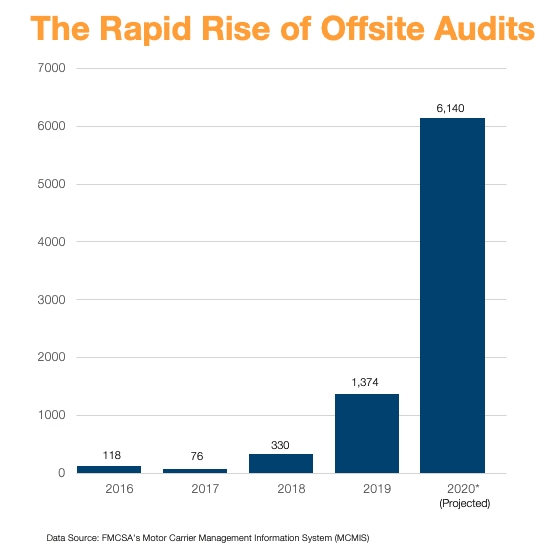Offsite Compliance Reviews are Rising Rapidly: Here’s What You Need to Know

The COVID pandemic has changed that. In fact, the agency issued regulatory guidance that now allows them to determine carrier safety ratings (Satisfactory, Conditional or Unsatisfactory) through an offsite audit. Prior to the pandemic, an Unsatisfactory rating could only be issued through an onsite compliance review.
Related Content: Digital Offsite Audits Have Grown by 100 Percent (and Keep Climbing)
It’s a privilege that the FMCSA has been taking full advantage of, with state enforcement officials conducting 3,582 offsite compliance reviews through the end of July – that’s more than half of the total compliance reviews that have taken place so far this year.
We had long suspected that the FMCSA would eventually make the transition to offsite audits because of how easy and inexpensive they are for the agency to conduct – especially for the simpler new entrant safety audit. And while that has definitely proven true over the last year or so, what is perhaps more surprising (and has larger implications for motor carriers) is the transition to offsite compliance reviews as well.
It’s something all motor carriers should be aware of – and be prepared for – just in case they are contacted for a review soon.

Onsite vs. Offsite Compliance Reviews
There are three key differences between onsite and offsite compliance reviews that motor carriers need to be aware of:
#1: They Happen More Quickly
Motor carriers are given significantly less time to prepare for an offsite audit, with the entire process (from notification to completion) occurring in just a few weeks. This makes it critical that carriers stay on top of their compliance requirements and keep their information well organized. Once they’re contacted for a review, they won’t have a lot of time to make updates.
#2: Auditors Look at a Greater Number of Documents
Although you might have believed the opposite to be true, offsite audits are actually MORE thorough than onsite audits, with auditors looking at a greater number of documents than they’d ask for previously. For example, if you’re used to an auditor looking at a sampling of 3-4 driver files, you can now expect to hand over double that – as well as vehicle maintenance records. Making sure that you and all of your drivers are keeping up with their paperwork has never been more important (neither has having a reliable and easy to use filing system).
#3: All Documents Must be Submitted Electronically
As the name suggests, because offsite audits are held via phone and email communications, all documents must be submitted electronically. If you’re currently maintaining a paper filing system, this is going to create a big headache for you – as all files will need to be scanned, uploaded and sent to the auditor in a relatively short timeframe. Part of the decision to transition to offsite audits, is because the FMCSA felt that most carriers would have a digital filing system in place. If you haven’t yet transitioned to digital files, now is the time to do so.
From what we can see at Foley, and are hearing in the industry, the drastic increase in offsite compliance reviews is more than a temporary response to the COVID pandemic – it’s a shift that is here to stay. To ensure that your business is ready for the change, it’s critical that you have a system in place that is not only reliable, but that makes it easy for you to send digital files at a moment’s notice.
At Foley, our automated compliance solution will not only ensure that all of your documents are secure, well organized and kept in an electronic format, but we’ll help maintain these files for you on an ongoing basis to help ensure you’re always compliant and (offsite) audit ready. To learn more, please give us a call at (860) 815-0764.
Related Articles
FMCSA Data Shows That Offsite Audits are Here to Stay
FMCSA Has Expanded Offsite Audits in Response to COVID Crisis
3 Types of FMCSA Safety Investigations & How to Prepare for Them
.png)



